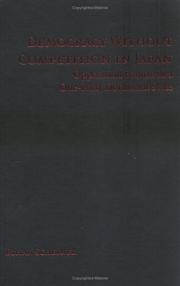| Listing 1 - 2 of 2 |
Sort by
|

ISBN: 1920942335 0731537572 9780731537570 9781920942335 Year: 2006 Publisher: ANU Press
Abstract | Keywords | Export | Availability | Bookmark
 Loading...
Loading...Choose an application
- Reference Manager
- EndNote
- RefWorks (Direct export to RefWorks)
"Power and Pork: a Japanese Political Life aims to tell the 'inside story' of a Japanese politician - Matsuoka Toshikatsu - one of the more controversial members of Japan's national Diet. The book details Matsuoka's political stratagems and policy activities as an archetypal 'traditional' politician representing farm and rural interests." "The scope of the work is contemporary Japanese domestic politics, including electoral processes, zoku influence, pork barrelling and 'money politics' as exemplified by one of its key players. Power and Pork gives an account of how Matsuoka has catered to local, sectional and clientele interests in order to build and retain his political power base. One of the most important conclusions of the book is that individual
Political corruption --- Political ethics --- Politicians --- Regions & Countries - Asia & the Middle East --- History & Archaeology --- East Asia --- Matsuoka, Toshikatsu, --- Japan --- Politics and government --- 松岡利勝, --- Jiyū Minshutō --- Corrupt practices. --- Jimintō (Japan) --- Jiyūminshutō (Japan) --- Liberal Democratic Party (Japan) --- Liberalʹno-demokraticheskai︠a︡ partii︠a︡ I︠A︡ponii --- Liberalʹno-demokraticheskai︠a︡ partii︠a︡ (Japan) --- LDP --- Tzu yu min chu tang (Japan) --- 自由民主党 --- 自由民主黨 --- Partido Liberal Demócrata (Japan) --- PLD --- Jiyūtō (1950-1955) --- Nihon Minshutō

ISBN: 0521846927 0521609690 1107152569 9786611040093 0511334443 0511567812 0511610661 1281040096 0511333781 0511333102 0511335024 9780511335020 9780511334443 9780511610660 9780511333781 9781281040091 9780521846929 9780521609692 9780521846929 9780521609692 9781107152564 6611040099 9780511333101 9780511567810 Year: 2006 Publisher: Cambridge ; New York : Cambridge University Press,
Abstract | Keywords | Export | Availability | Bookmark
 Loading...
Loading...Choose an application
- Reference Manager
- EndNote
- RefWorks (Direct export to RefWorks)
Despite its democratic structure, Japan's government has been dominated by a single party, the Liberal Democratic Party (LDP) since 1955. This book offers an explanation for why, even in the face of great dissatisfaction with the LDP, no opposition party has been able to offer itself as a credible challenger in Japan. Understanding such failure is important for many reasons, from its effect on Japanese economic policy to its implications for what facilitates democratic responsiveness more broadly. The principal explanations for opposition failure in Japan focus on the country's culture and electoral system. This book offers a new interpretation, arguing that a far more plausible explanation rests on the predominance in Japan of clientelism, combined with a centralized government structure and electoral protection for groups that benefit from clientelism. While the central case in the book is Japan, the analysis is also comparative and applies the framework cross-nationally.
Democracy --- Political parties --- Patronage, Political --- Patron and client --- Démocratie --- Partis politiques --- Favoritisme --- Patron et client --- Jiyu Minshuto. --- Japan --- Japon --- Politics and government --- Politique et gouvernement --- J4655 --- J4610 --- -Jiyū Minshutō --- -Patronage, Political --- -Patron and client --- -Japan --- -Clientela --- Clientelism --- Patronage, Roman --- Political patronage --- Spoils system --- Civil service reform --- Parties, Political --- Party systems, Political --- Political party systems --- Political science --- Divided government --- Intra-party disagreements (Political parties) --- Political conventions --- Self-government --- Equality --- Representative government and representation --- Republics --- Japan: Politics and law -- central government -- political parties --- Japan: Politics and law -- theory, methodology and philosophy --- -J4655 --- -Japan: Politics and law -- central government -- political parties --- -Democracy --- Démocratie --- Jiyū Minshutō. --- Clientela --- Jimintō (Japan) --- Jiyūminshutō (Japan) --- Liberal Democratic Party (Japan) --- Liberalʹno-demokraticheskai︠a︡ partii︠a︡ I︠A︡ponii --- Liberalʹno-demokraticheskai︠a︡ partii︠a︡ (Japan) --- LDP --- Tzu yu min chu tang (Japan) --- 自由民主党 --- 自由民主黨 --- Partido Liberal Demócrata (Japan) --- PLD --- Jiyūtō (1950-1955) --- Nihon Minshutō --- Social Sciences --- Political Science --- Dominant-party systems. --- One-party dominant systems --- Clientelism, Political --- Patron-client politics --- Political clientelism --- Political sociology
| Listing 1 - 2 of 2 |
Sort by
|

 Search
Search Feedback
Feedback About UniCat
About UniCat  Help
Help News
News